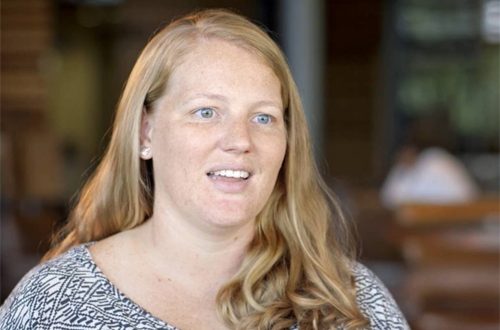
How can we be angry about culture or politics and not sin?
Raise your hand if you feel like you live in a time where people love empty words and seek after lies. Where the honor of seeking to follow Jesus and listen to his Word is turned to shame. That’s exactly how King David felt in Psalm 4. So he gives himself some good advice: “Be angry, and do not sin; ponder in your own hearts on your beds, and be silent.”
David urges himself to begin with deep reflection alone on his bed in silence. We can benefit from the same advice. Here’s a prompt for our reflection: What does it mean to be a person of truth and grace in a culture of lies?
The ninth commandment, “Do not bear false witness against your neighbor,” gives us a good place to begin: And the Westminster Catechism offers us a great little test to help us take the measure of our own commitment to truth. After all, we can’t do nearly as much about changing others as we can about changing ourselves:
- Are we committed to “preserving and promoting truth between man and man?
- Are we committed to “preserving and protecting the good name of our neighbor, as well as our own”? (What if our neighbor is on the other political side? What if we are engaged on social media?)
- Are we “standing for the truth; and from the heart, sincerely, freely, clearly, and fully, speaking the truth, and only the truth, in matters of judgment and justice, and in all other things whatsoever?” (How can we be assured that our take on matters of culture and politics is God’s truth?)
- Do we seek to live out “a charitable esteem of our neighbors; loving, desiring, and rejoicing in their good name; sorrowing for and covering their infirmities; freely acknowledging their gifts and graces”?
- Do we “defend their innocence; always ready to receive a good report about them, always skeptical or unwilling to admit of an evil report, concerning them?”
- Are we “quick to discouraging talebearers, flatterers, and slanderers”? (Or quick to embrace them if their political sympathies align with ours?)
- Are we committed to “studying and practicing whatsoever things are true, honest, lovely, and of good report”?
I was prompted to take a look at these “duties” of the 9th commandment by David French, which he referenced in his new book, Divided We Fall. I’ve gone back and forth on French, who has stood against President Trump’s hit-his-opponents-twice-as-hard presidency in favor of pursuing cultural and political change with decency, civility and protection of individual rights.
I’ve been on record agreeing in principle with French’s criticism of Trump, but not to the point of being a Never Trumper, as French has. Still, I try to read the work of good thoughtful believers, like French, so that their iron might sharpen my iron.
At an online conversation sponsored by The Trinity Forum last week, French pointed to extreme polarization as a major contributor to why many Americans find themselves living with significant frustration and anger in the wake of the election
Taken together with the pandemic, many find themselves living in a time of maximum stress, pressure and distrust. Isolated from the real presence of church and friends and clustering together with people of like minds online, siloing around media, the result is a perfect storm of polarization and anger for both sides. You can watch the hour-long conversation here: Online Conversation | Faith, Fear, and Conspiracy, with David French – YouTube
“Distrust is one thing, French said, “but what we are seeing is a deep sense of fear and animosity along with distrust and this is what we call “negative polarization.” It’s not so much that you love your political party’s values and ideas, but you despise and have contempt for the other side. One study reports that both sides of our cultural and political divide believe that the other side is “hateful, brainwashed and out to get them.” “This has become the animating spirit of our political age.”
French’s practical suggestions to ramp down the negative polarization, anger and fear
Take far more care with “uncurated media consumption.” We cannot blindly trust certain information sources indiscriminately, regardless of whether they dispense news in ways that whip up fear or make hash out of the Christian teachings of the Westminster Chatechism. I’m going to accept information, not based on its merits, but its source”—whatever Tucker or Hannity have to say about it.
“Try not to think of yourself as a lawyer for your side. Think of your job as a juror. My job is to judge whether this which argument, among competing arguments, is true.” Follow the evidence wherever it leads.
“Always try to engage with the other side through the best expression of the other side’s ideas. Read about a new idea from its original proponents instead of its detractors.” Or read book reviews or articles that summarize it as neutrally or positively as possible.
Take a hard look at the quantity of your media consumption
“Here’s an embodied practice that many American Christians have,” said French, “Come home from work, have dinner, turn on Fox, and then turn off Fox right before you go to bed. It’s a habit of life. A habit of mind.” “We use politics as a source of entertainment. If you are watching more politics than you are reading books, or enjoying other forms of cultural entertainment, perhaps your priorities are out of balance. Be wary of politics as infotainment.”
Here’s an alternative: Go out and have coffee with real people and have real conversations about political and cultural issues. “People who watch more media tend to think the other side is more extreme, more contemptible than people who engage with the other side through relationships,” he said.
Model Biblical values of truth telling, kindness and civility
We need to be as focused on the way we deal with issues as we are on the issues themselves. Cultivate an atmosphere where a person is open to discussion and open to changing their minds. If a person, or a group, or even a congregation is not ready to receive information (say, something on media habits), then the response is going to be volcanic. “
We need to back into these discussions by addressing habits of the heart that make us open, gracious and tolerant. Who are supposed to be as we interact w our neighbors? (Westminster Catechism) Are you that person? Then walk into issues.”
“Be very selective and careful as to when you’re going to dive in on online arguments…Don’t blow up relationships as part of an endless quest to deal w someone who’s wrong online. That’s not your mission. Especially on Twitter. Work for conversation.”
And when harsh words are said, “rebuild a sense of grace. We tend to define a person by their worst tweet… We can’t twitter our way to justice and forget kindness.” Cancel culture exists in large part because grace does not.
Our inclination should be to discourage tale bearers
Again, in the spirit of the Westminster Catechism the worse the report, the wilder the tale you are going to deliver about another person, the higher should be our skepticism. The greater the proof required.
Be involved in building better communities
“The answer to negative polarization over the long term is in building better institutions.” Building better communities—healthy, loving communities of virtuous purpose. People were vulnerable to Critical Theory and Black Lives Matter because of negative polarization. Why do people get attached to it? Because of the sense of community and shared virtuous purpose. When we are more actively engaged through our church or as individuals with outreach in our churches, with serving real community needs, we won’t feel such a need to silo around media.
Ask the Lord Jesus to exchange your anger and fear for appropriate concern
“We’ve had it pounded in… America is almost over. The church is at stake. They are coming for you,” said French. “Yes, be concerned, but not afraid. This is not a crisis. Acknowledge concern. Speak against the spirit of fear.”
As I wrote in my last post, lament is such an appropriate response to the changes we’re seeing and modelled throughout Scripture, even by Jesus weeping over Jerusalem. And anger is a natural response to injustice. But our most proactive response can be to ponder the habits of our hearts, the ways we can be people of truth, and then put our trust in the Lord. He has an amazing track record of growing his church in times of persecution.
Psalm 4:5,6,8 Be angry, and do not sin; ponder in your own hearts on your beds, and be silent. Selah Offer right sacrifices, and put your trust in the LORD….In peace I will both lie down and sleep; for you alone, O LORD, make me dwell in safety.




